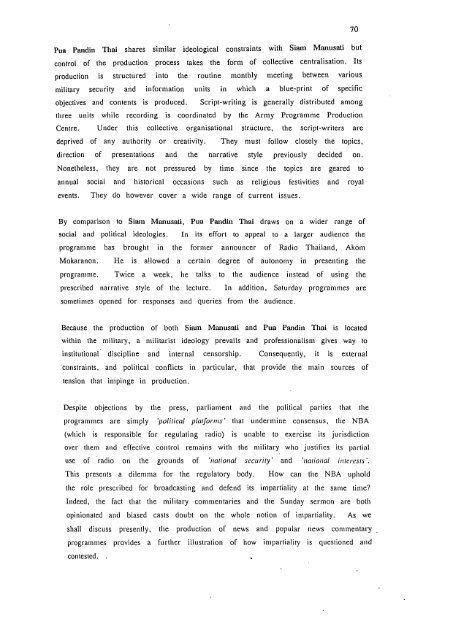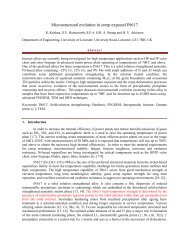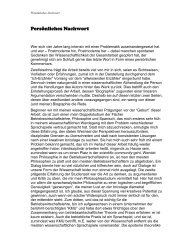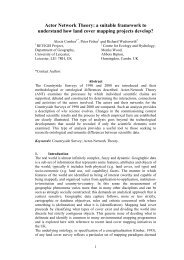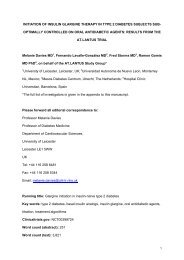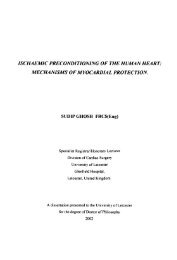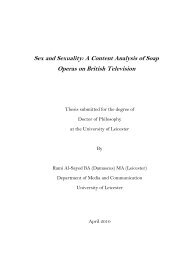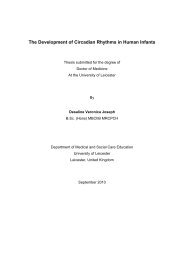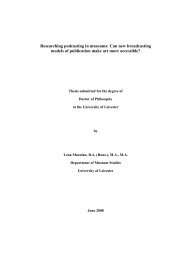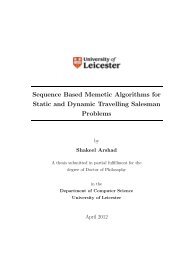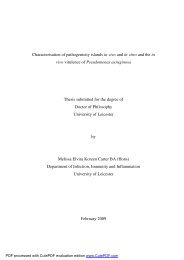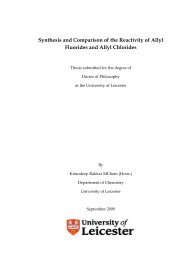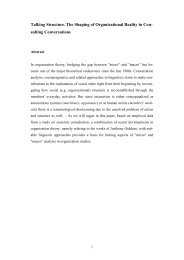iieiiei1eWrkers - Leicester Research Archive - University of Leicester
iieiiei1eWrkers - Leicester Research Archive - University of Leicester
iieiiei1eWrkers - Leicester Research Archive - University of Leicester
You also want an ePaper? Increase the reach of your titles
YUMPU automatically turns print PDFs into web optimized ePapers that Google loves.
Pua Pandin Thai shares similar ideological constraints with Siam Manusati but<br />
control <strong>of</strong> the production process takes the form <strong>of</strong> collective centralisation. Its<br />
production is structured into the routine monthly meeting between various<br />
military security and information units in which a blue-print <strong>of</strong> specific<br />
objectives and contents is produced. Script-writing is generally distributed among<br />
three units while recording is coordinated by the Army Programme Production<br />
Centre. Under this collective organisational structure, the script-writers are<br />
deprived <strong>of</strong> any authority or creativity. They must follow closely the topics,<br />
direction <strong>of</strong> presentations and the narrative style previously decided on.<br />
Nonetheless, they are not pressured by time since the topics are geared to<br />
annual social and historical occasions such as religious festivities and royal<br />
events. They do however cover a wide range <strong>of</strong> current issues.<br />
By comparison to Slain Manusati, Pun Pandin Thai draws on a wider range <strong>of</strong><br />
social and political ideologies. In its effort to appeal to a larger audience the<br />
programme has brought in the former announcer <strong>of</strong> Radio Thailand, Akom<br />
Mokaranon. He is allowed a certain degree <strong>of</strong> autonomy in presenting the<br />
programme. Twice a week, lie talks to the audience instead <strong>of</strong> using the<br />
prescribed narrative style <strong>of</strong> the lecture. In addition, Saturday programmes are<br />
sometimes opened for responses and queries from the audience.<br />
Because the production <strong>of</strong> both Siam Manusati and Pua Pandin Thai is located<br />
within the military, a militarist ideology prevails and pr<strong>of</strong>essionalism gives way to<br />
institutional discipline and internal censorship. Consequently, it is external<br />
constraints, and political conflicts in particular, that provide the main sources <strong>of</strong><br />
tension that impinge in production.<br />
Despite objections by the press, parliament and the political parties that the<br />
programmes are simply 'political platforms' that undermine consensus, the NBA<br />
(which is responsible for regulating radio) is unable to exercise its jurisdiction<br />
over them and effective control remains with the military who justifies its partial<br />
use <strong>of</strong> radio on the grounds <strong>of</strong> 'national security' and 'national interests.<br />
This presents a dilemma for the regulatory body. How can the NBA uphold<br />
the role prescribed for broadcasting and defend its impartiality at the same time?<br />
Indeed, the fact that the military commentaries and the Sunday sermon are both<br />
opinionated and biased casts doubt on the whole notion <strong>of</strong> impartiality. As we<br />
shall discuss presently, the production <strong>of</strong> news and popular news commentary<br />
programmes provides a further illustration <strong>of</strong> how impartiality is questioned and<br />
contested.<br />
70


